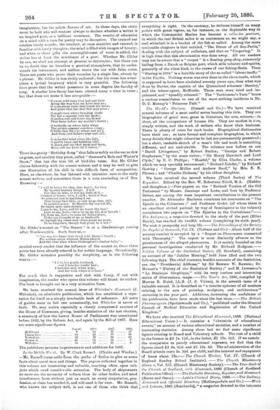In the Middle Wa . ch. By W. Clark Russell. (Ghetto and
Winclus.) —Mr. Russell turns aside from the paths of fiction to give us some facts about naval men and things. The papers collected together in this volume are interesting and valuable, touching often upon sub- jects which need considerable attention. The body of shipowners no more see the necessity of reform than do other bodies, and need interference from without just as much as every corporation, pro- fession, or class has needed it, and will need it for ever. Mr. Russell, who knows the subject well, is not one of those who think that everything is right. On the contrary, he delivers himself on many points with great vigour, as, for instance, on the deplorable way in which the Commercial Marine has become a colluries gentiuns, in which the real British sailor is as uncommon as, we might say, a real whitebait is in a bucket of the fish so called. Among the more noticeable chapters is that entitled, "The Direst of all Sea-Perils,". dealing with the subject of collisions, and that on "Coopering." It is high time that this abomination was done away. All our readers may not be aware that a " cooper " is a floating grog-shop, commonly hailing from a Dutch or Belgian port, which sells tobacco and spirits, generally of the vilest kind, to the crews of our fishing-fleets. Then "Slaving in 1884" is a horrible story of the so-called "labour-traffic" in the Pacific. Nothing worse was ever done in the slave-trade, which is supposed to have been abolished seventy years ago, than what was done by Davies, the captain of the Queensland schooner Stanley,' and the labour-agent, McMurdo. These men were tried and im- prisoned, and "speedily released." The " Yachtsman's Yarn" bears a curious resemblance to one of the most striking incidents in Mr. D. C. Murray's "Primrose Path."


































 Previous page
Previous page